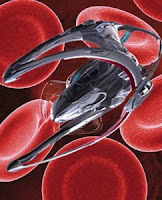For more than a decade, researchers have been trying to develop nanoparticles that would deliver drugs more effectively and safely. The idea is that a nanoparticle containing a drug compound could selectively target tumor cells or otherwise diseased cells, and avoid healthy ones. Antibodies or other molecules can be attached to the nanoparticle and used to precisely identify target cells. "One of the largest advantages of nanotechnology is you can engineer things in particle form so that chemotherapeutics can be targeted to tumor cells, protecting the healthy cells of the body and protecting patients from side effects," says Sara Hook, nanotechnology development projects manager with the National Cancer Institute.
But executing this vision has been difficult. One challenge: a drug's behavior in the body can change dramatically when it's combined with nanoparticles. A nanoparticle can change a drug's solubility, toxicity, speed of action, and more—sometimes beneficially, sometimes not. If a drug's main problem is that it's toxic to off-target organs, then nanotechnology can ensure that it's delivered to diseased cells instead of healthy cells. But if a drug depends on being absorbed quickly by diseased cells to be effective, a nanoparticle may slow the process and turn an optimal therapeutic into second best.
Technology Review:
Fine-tuning Nanotech to Target Cancer

Comments